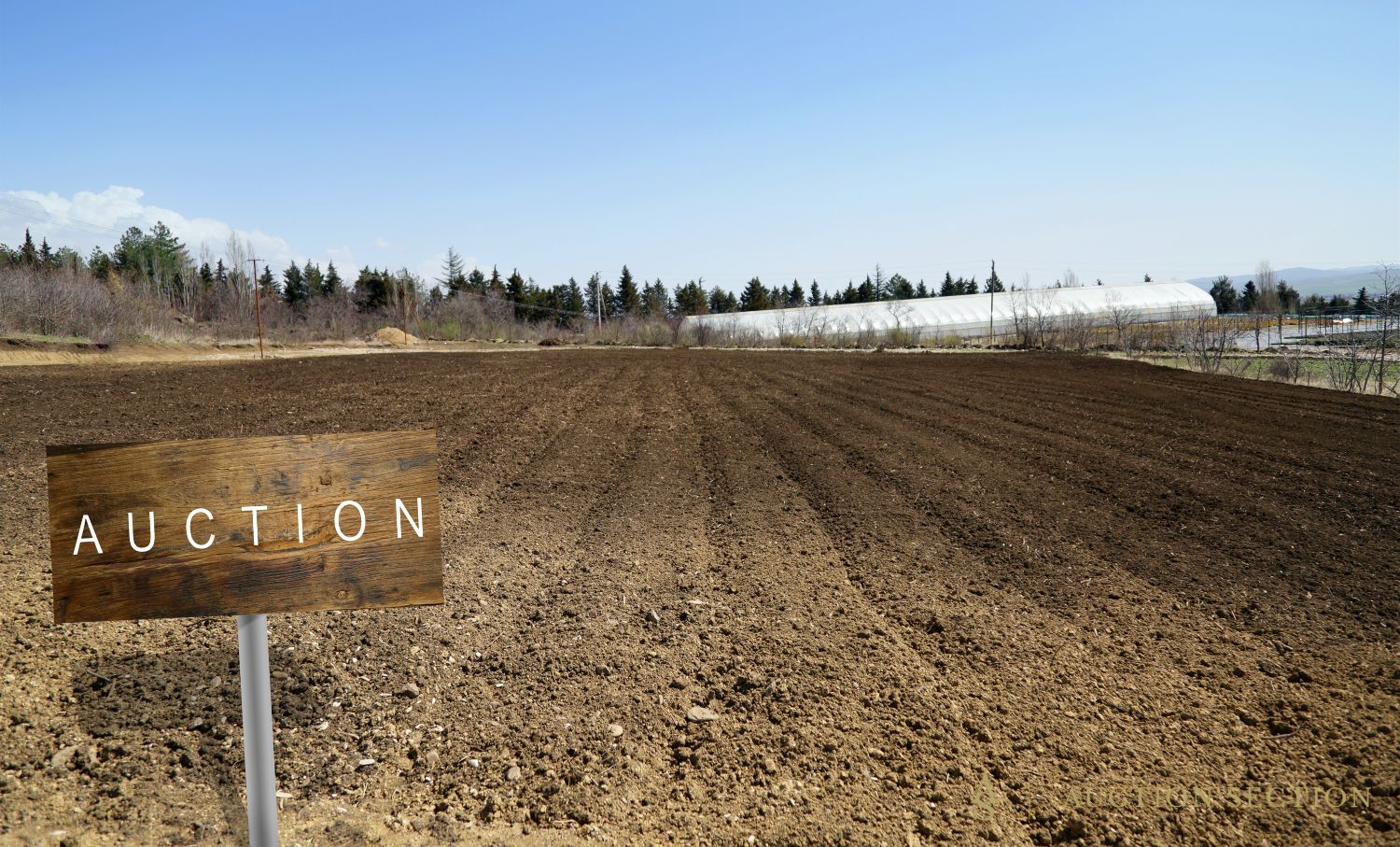
Land auctions provide a fast and transparent way to buy or sell property. Unlike traditional listings, they eliminate lengthy negotiations and provide both parties with a precise sale date. This method is particularly effective for farmland, estate holdings, and vacant plots in areas with growing demand.
Sellers gain control over sale terms, benefit from competitive bidding, and often close faster than with regular listings. Buyers enjoy open access to information and a level playing field that reflects real market value. In Texas, auctions are gaining popularity due to their speed and fairness.
This guide explains how land auctions work, what distinguishes them from private sales, and how buyers and sellers can prepare for success at every stage of the process.
What Is a Land Auction?
A land auction is a public sale where parcels are offered to the highest bidder on a specified date. Unlike standard real estate listings, land auctions set a specific sale date, eliminate back-and-forth negotiations, and attract motivated buyers. Commonly used in Texas land auctions, this approach is particularly well-suited for agricultural tracts, recreational plots, and estate properties held in trust. The method ensures fairness, efficiency, and a transparent value discovery system.
Why Are Land Auctions Popular?
Land auctions have gained popularity due to their speed and market-driven pricing. Sellers can condense months of marketing into a single event, while buyers benefit from equal access to terms and property details. Online bidding tools offered by the Auction Section further broaden the competitive field, attracting remote bidders and increasing final sale prices.
How Land Auctions Differ from Traditional Sales?
When compared to conventional listings, land auctions demand less time and paperwork. Traditional sales involve listing agreements, showings, counteroffers, and unpredictable closing dates. In contrast, auction participants are aware of the deadline, can review the terms in advance, and focus solely on bidding. The final price reflects real-time demand rather than an estimated listing price.
How Do Land Auctions Work?
Here’s a detailed look at how a typical land auction proceeds, step by step.
Preparing for the Auction
Sellers provide clear title deeds, surveys, and any environmental reports. The Auction Section then creates a dynamic marketing plan that combines digital ads, direct outreach, and local promotions. Buyers should research similar Texas land auctions, review auction terms, and secure financing early to bid confidently.
Marketing the Sale
An effective marketing campaign is essential. The Auction Section utilizes online portals, email campaigns, and social media to target qualified buyers. Print ads in regional newspapers and signage near the property ensure local awareness and drive turnout to in-person or online bidding events.
The Bidding Process
On auction day, bidding can take place live in Texas or online through secure portals. In an absolute auction, the highest bid wins regardless of the amount. In a reserve auction, the seller’s minimum price must be met before the sale can proceed. The Auction Section guides you on which type best suits your Texas land.
Post-Auction Steps
The winning bidder places an earnest money deposit and signs a purchase agreement, typically within 24 hours of the auction’s conclusion. Closing usually occurs within 30 to 60 days, encompassing title transfer, final payment, and any necessary legal requirements. This process is streamlined through the Auction Section’s network of title professionals and lenders.
Why Choose Land Auctions as a Seller?
For sellers, choosing a land auction offers distinct advantages over traditional sales, primarily centering on speed, control, and maximizing returns. Here’s a closer look at why this method proves beneficial:
Fast, Predictable Timeline
With a set auction date, sellers avoid lengthy listing periods. Auction Section’s Texas land auctions typically close within weeks, freeing you from ongoing taxes and maintenance costs.
Control Over Sale Terms
You set your reserve price and accept the final bid. This ensures you never have to sell below your expectations and allows you to dictate the terms of sale.
Maximum Exposure and Competitive Bidding
Our dynamic marketing approach draws both local and remote investors. Competition often drives bids above market estimates, boosting your net proceeds.
Why Choose Land Auctions as a Buyer?
Competitive bidding reflects bona fide market demand. Buyers view current offers in real time, ensuring fair purchase prices.
Transparent Market Pricing
Competitive bidding reflects bona fide market demand. Buyers view current offers in real time, ensuring fair purchase prices.
Broad Property Selection
Texas land auctions offer a diverse range of properties, from rural ranches to development-ready tracts, providing buyers with options tailored to their specific goals.
No Negotiation Hassles
The auction format removes prolonged negotiations. Buyers focus on research and bidding strategy, saving time and stress.
Types of Land Auctions
Choosing the right land auction type is a strategic decision for both parties. Here’s an overview of the most common formats and how they operate:”
Absolute Auctions
Sold to the highest bidder, these auctions offer potential bargains but require sellers to accept any bid that is made.
Reserve Auctions
Sellers set a minimum price to protect their investment. If bids do not reach the reserve, they can choose to relist or negotiate privately.
Sealed Bid Auctions
Buyers submit private offers by a deadline. This method suits projects requiring confidentiality and online Texas land auctions.
Buyer Prep That Wins Auctions
- Research recent comparable land sales in your region
- Study auction terms, conditions, and bidding rules in advance
- Set a firm maximum bid and stick to your budget.
- Secure financing pre-approval so you’re ready to close
- On auction day, arrive early or log in ahead of time to test the platform.
Seller Prep for Maximum Impact
- Partner with the Auction Section to assemble title deeds, surveys, and reports
- Decide on a realistic reserve price that protects your bottom line.
- Craft a high-impact marketing plan to attract qualified bidders.
- Coordinate site visits and ensure smooth on-site or online access.s
- Be on hand on auction day to field questions and guide bidders through the process.
What Sets Auctions Apart from Conventional Sales
| Aspect | Land Auction | Traditional Sale |
| Timeline | Weeks from listing to closing | Months of listings, showings, and negotiations |
| Pricing | Market-driven by competitive bids | Based on listing price and counteroffers |
| Control | The seller sets the reserve and terms | Subject to buyer negotiations |
| Costs | Auctioneer fees, marketing expenses | Agent commissions, holding costs |
Frequently Asked Questions
If bids fail to meet your reserve or no bids occur, you can relist, negotiate privately, or adjust your terms for a new auction date.
Most auctions are open to the public, though some require registration and proof of funds. The Auction Section provides clear instructions on how to register for each event.
Seller fees typically range from 5% to 10% of the sale price, covering both auctioneer services and marketing expenses. Buyer fees vary by auction type; verify costs in the auction terms.
Reputable platforms used by the Auction Section incorporate encryption and verification steps to protect bidders. Always verify the auctioneer’s credentials before participating.
We handle residential, commercial, agricultural, recreational, and undeveloped tracts across Texas, tailoring our process to each land type.
Ready to Sell or Buy in Texas Land Auctions?
Land auctions transform the traditional real estate process by consolidating marketing, negotiations, and closing into a single competitive event. Sellers benefit from accelerated timelines, transparent pricing, and complete control over reserve and sale terms. At the same time, buyers enjoy equitable access to detailed property information and the opportunity to bid in real-time. Whether dealing with agricultural acreage, recreational tracts, or estate properties, this method consistently delivers efficiency, fairness, and results driven by the market.
Ready to harness the power of land auctions for your next transaction? Explore our Land Auction in Texas to discuss how our expert team, advanced marketing strategies, and seamless auction platform can help you buy or sell land quickly, profitably, and with complete confidence.


